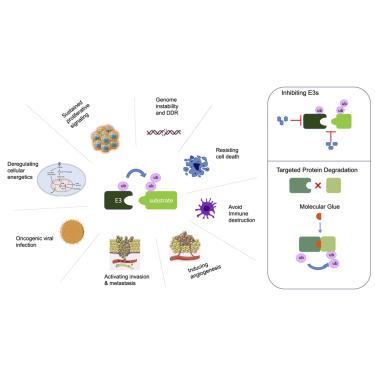Cell Chemical Biology ( IF 6.6 ) Pub Date : 2021-05-10 , DOI: 10.1016/j.chembiol.2021.04.008 Shanshan Duan 1 , Michele Pagano 2

|
Ubiquitylation, a highly regulated post-translational modification, controls many cellular pathways that are critical to cell homeostasis. Ubiquitin ligases recruit substrates and promote ubiquitin transfer onto targets, inducing proteasomal degradation or non-degradative signaling. Accumulating evidence highlights the critical role of dysregulated ubiquitin ligases in processes associated with the initiation and progression of cancer. Depending on the substrate specificity and biological context, a ubiquitin ligase can act either as a tumor promoter or as a tumor suppressor. In this review, we focus on the regulatory roles of ubiquitin ligases and how perturbations of their functions contribute to cancer pathogenesis. We also briefly discuss current strategies for targeting or exploiting ubiquitin ligases for cancer therapy.
中文翻译:

癌症中的泛素连接酶:功能和临床潜力
泛素化是一种高度调控的翻译后修饰,控制着许多对细胞稳态至关重要的细胞途径。泛素连接酶招募底物并促进泛素转移到靶标上,诱导蛋白酶体降解或非降解信号传导。越来越多的证据强调了泛素连接酶失调在癌症发生和进展相关过程中的关键作用。根据底物特异性和生物学背景,泛素连接酶可以充当肿瘤启动子或肿瘤抑制子。在这篇综述中,我们重点关注泛素连接酶的调节作用以及其功能的扰动如何促进癌症发病机制。我们还简要讨论了当前针对或利用泛素连接酶进行癌症治疗的策略。











































 京公网安备 11010802027423号
京公网安备 11010802027423号